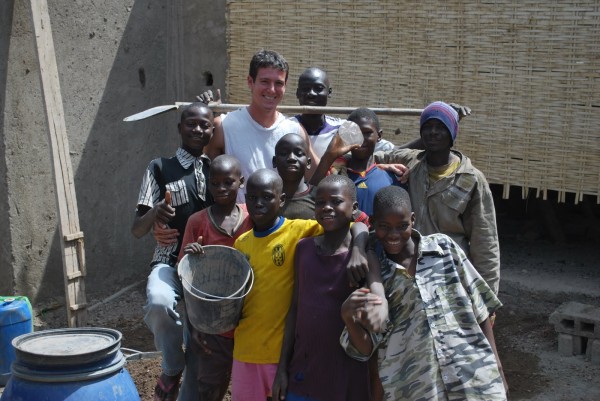THERE’S A HARSH MOMENT when you first get what it actually means to be a Peace Corps volunteer. Waking up in a pool of sweat as flies repeatedly landed on my face in a small Senegalese village in 2009, I realized that despite all the research and preparation I had undertaken in the months leading up to my departure, I’d never really had a clue as to what was in store.
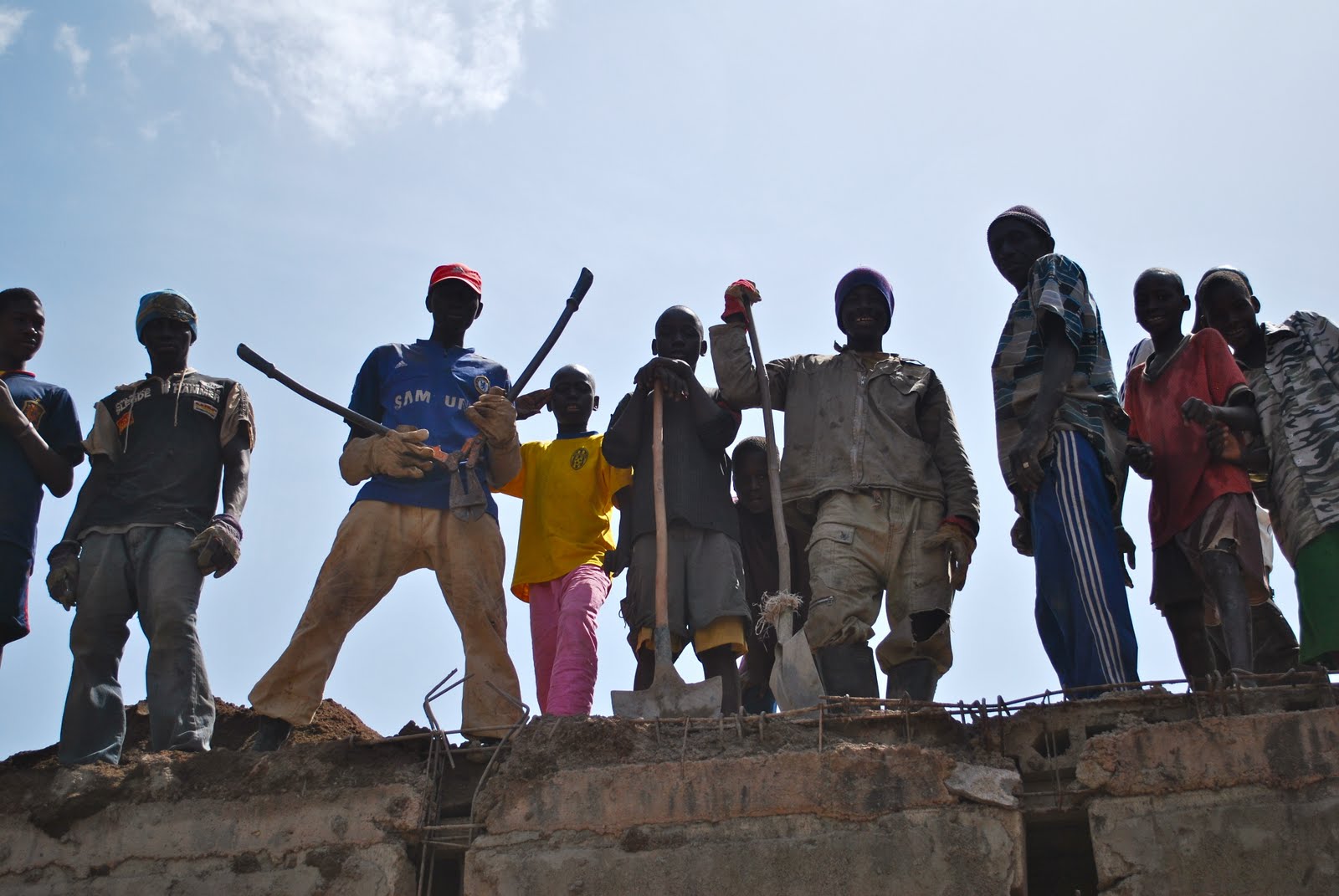

I suppose I imagined myself dressed in ruggedly handsome khakis, a cold beer accompanying my five-o’clock shadow as I sat in some creaky-fan third-world bar after a day full of building wells and various other forms of “international developing.” While the reality proved far more rewarding (yet disappointingly short on cold drinks), it had little to do with the popular preconceptions and gushy, mango-filled volunteer testimonials that I read while forming my decision to join.
So, before you start envisioning yourself bringing development to the masses from a hammock in the remote wilderness, here are a few thoughts to consider on whether or not the Peace Corps is for you.
Step 1: Figure out your motives.
Noble as your enthusiasm to dedicate two years of your life to helping the less fortunate may be, most of us have other motives. Sure, altruism can be one reason, but despite what you may say in an interview, the true first step to volunteering is figuring out what exactly you want out of the Peace Corps service.
What new experiences are you looking to gain? What new skills are you hoping to learn? What new places do you want to explore? If you really are solely interested in dedicating your time to the service of others, I commend you for making me sound like an asshole, but Peace Corps might not be the best choice for you. Truth is, as a large portion of your time will be spent either sitting around waiting for things to happen or getting teased mercilessly because you don’t fit in, it would probably be best if you went and spent your virtuous energy building houses on some alternative spring break.
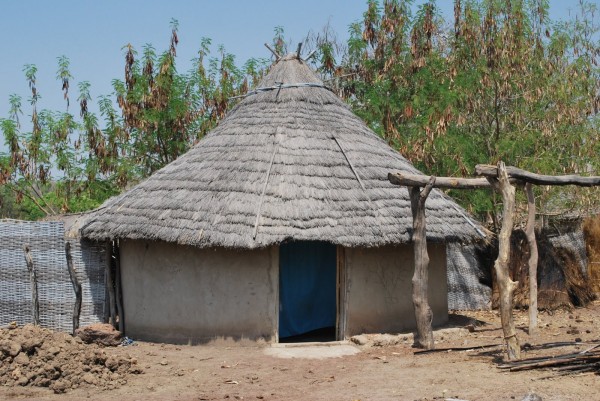
Home sweet home: Bembou, Senegal. This was my living quarters for the 2 years of my Corps experience. Not too shabby, eh? Photo: Author
This is not to say that as a Peace Corps volunteer you will neither help others nor spend your time effectively. You will…mostly. But as much time as you spend “helping” your local community, a far greater amount will be spent awkwardly adapting to the culture and language, struggling to integrate, and surprising yourself with the significant connections you can forge with people of such wildly different backgrounds from anyone you’ve ever met.
So, think it over. If the language, people, and endless daily problem solving sound more tiring than exciting, but you really need a job out of college…realize that this probably won’t sustain you when you’re shitting yourself dry thanks to the parasites living in your drinking water.
Step 2: Don’t romanticize.
Yes, even just 15 years ago the average PC volunteer left their family and friends at home and traveled off to an exotic, faraway land not to be seen or heard from for the two years save for the occasional static-filled phone call.
Not anymore.
Cell service is everywhere. The juxtaposition of a fancy mobile phone with intense mud-hut village poverty may seem ridiculous, but I guarantee at least one person in that village has a smart phone and there’s a good chance he’s got 3G too.
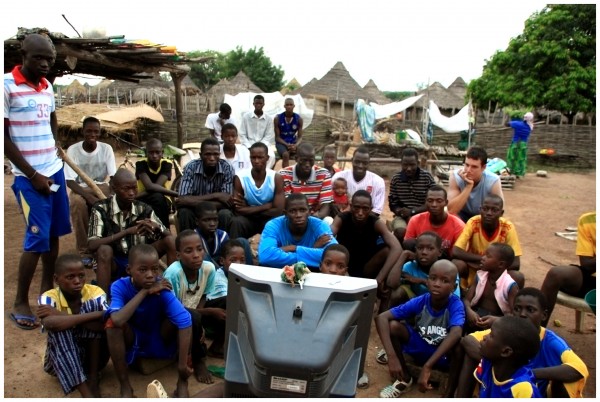
My village, gathered around the digital hearth for some World Cup viewing action. Can you find me? Photo: Chris Gallagher
Volunteers themselves have changed as well. Several years ago, few volunteers had access to the internet, let alone their own computer. Now, almost 100% show up with a laptop and an overstocked hard drive of music, movies, and TV shows. Many will find that their new homes come with at least occasional electricity and possibly even running water (as of 2008, 82% and 73% of all volunteers, respectively).
In short, the oft-romanticized Peace Corps experience has evolved. Volunteers are able to maintain a level of connectivity and modernity that they never imagined possible and that may often seem at odds with their surroundings. Blogs are on overdrive, and communicating with friends and family members is so convenient that for some the constant reminder of home and the crutch of a familiar support network can prevent them from fully committing to their new lives.
Even volunteer work responsibilities have begun to change due to the connectedness. While community projects remain the primary activity, more and more time is spent handling grants, writing project updates, and preparing reports.
So yes, you may end up in that mud hut in a distant village far from a real toilet, electricity, friends, or anyone who understands English. But you also may have an apartment, complete with a full kitchen, hot water, and a TV. Both can give you just as significant an experience, and both will challenge you in their own way. Just be ready to blog.
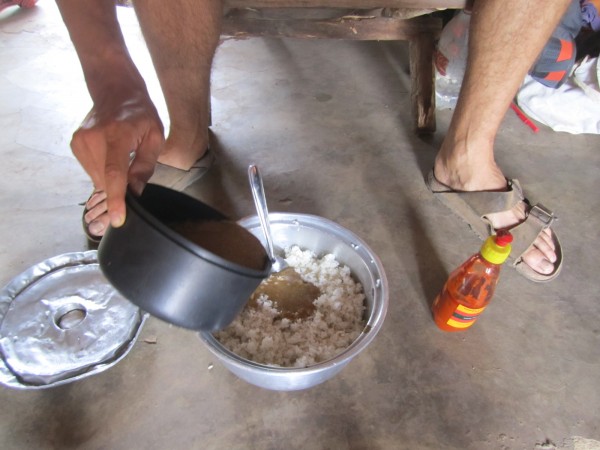
The average dinner: a nice bowl of rice, some gravyish liquid, and never enough hot sauce.
Photo: Author
Step 3: Be patient.
Throughout your Peace Corps service, you will spend unbelievable amounts of time waiting for things to happen. Work, and life in general, will move at a slower pace.
Many days will pass with little forward progress, and it will be challenging to maintain your motivation while discovering how best to adapt and remain effective in this new setting. Luckily, Peace Corps has planned ahead, and there’s an easy and mandatory way to prepare for all of these future delays, setbacks, and disappointments: The Peace Corps application process.
Comprehensive and rightly exhaustive, the Peace Corps application process weeds out more would-be volunteers than anything else just because it takes so fucking long. While the application itself is rather straightforward, be prepared to answer for every abnormal cough, sprain, or allergy you’ve ever had with additional sub-applications, and God help you if you’ve ever had counseling. Relationships don’t escape the scrutiny either, as PC does its best to make sure you have minimal reasons to come home early.
Should you prove to be a stolidly healthy individual of stone cold self-assurance and limited emotional ties on this Earth, nomination will designate the region of your future placement. As a Peace Corps-defined “region” can be as large as the entirety of Sub-Saharan Africa, this will not be of much help to you, and will doubtlessly only fuel your impatience.
Nevertheless, you have now reached an important milestone, similar to making it to that second waiting room at the doctor’s office after you’ve cleared all the poor, helpless fools in reception. You will now get placed in some program, somewhere, sometime within the next year. When the day finally comes that you receive your assignment folder in the mail, don’t neglect to do some research and talk to current volunteers in your country of service for advice on how to prepare and what to bring (see www.peacecorpsjournals.org or Facebook groups). Most things will be available, if pricey, but a sturdy pair of sandals is worth its weight in gold.
Step 4: Be realistic.
No matter where you’re posted, be it beachside, in freezing hinterlands, a dusty village, or even the relative development of a large city, there will be significant challenges, both mental and physical, to overcome. Here are a few tips to keep in mind for once you hit the ground:
Legitimacy must be earned: As much as your in-country technical training may prepare you for your assignment, a farmer who has been planting and cultivating his entire life is not going to listen to some idiot who shows up out of nowhere, speaks poorly, and claims to know all the answers. Even if you do have significant technical expertise in your field, building trust will take time.
As many aid agencies neglect to properly involve the community and fail to follow through on promises, your work partners may be skeptical of investing their time and resources no matter how worthy you believe your project to be. Let your actions speak for your intentions, and never hesitate to get your hands dirty alongside your partners (except for school gardens, where the kids have way too much energy and are eager to help. It’s not breaking labor laws if no labor laws exist).
Language will take time: Learning to speak a new language is a significant endeavor, and as much as Rosetta Stone wants us to believe it has the quick and easy answer, the truth is we don’t have time to go about relearning everything like we did as a baby. Far more effective is to constantly make a fool of yourself and always be trying to talk.
While in the US we often take pains to compliment a new speaker, the developing world tends to be a lot harsher and you will get teased endlessly. Take solace in the knowledge that all of this effort will pay off, not only by facilitating your work and forging new friendships, but most importantly by letting you make fun of everyone around you.
Results may not always meet your expectations: In other words, be prepared to fail a few times. Let these experiences guide your future activities, and never forget that no matter what you think is best for the community, the key to success and sustainability will in the end be due to their efforts, not yours. Some setbacks are inevitable — no matter how strong you make that garden fence, the goats will always find a way.
You’ve got time: 27 months is a long, long time. Even when everything is going smoothly this can be overwhelming, and once discouraged two years can seem downright eternal. Keeping busy is important, but don’t feel pressured to always be working. Pushing too fast can often be counterproductive, and spending a few hours sitting drinking tea with your well digger may do more to move things forward than you think.
Make sure to take time to explore your surroundings: go on bike rides, travel to nearby communities, converse and connect with the people you encounter. The lasting impact of your service will not be one of improved gardens, better English, more handwashing, or a new and improved well. No, much more likely it will be the memory of that one crazy American who took the time to live like a local, eat the food, and actually talk to people.
Step 5: Commit.
Most importantly: remember that this experience all comes down to you.
You will get out of it what you put in, and it really is a waste of your time to sit in some third-world country watching American movies all day and wishing you were home. The things you see, the skills you learn, and the people you meet will form an invaluable experience, likely to influence you for the rest of your life.
But none of this will happen if you aren’t willing to step out of your comfort zone and get sick on some weird food, butcher an important greeting, have forever dirty feet, or completely embarrass yourself trying to wash your own laundry by hand. Besides, how else would you get good material for your blog?
